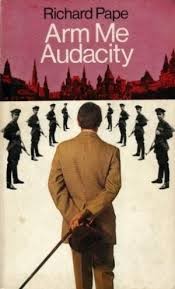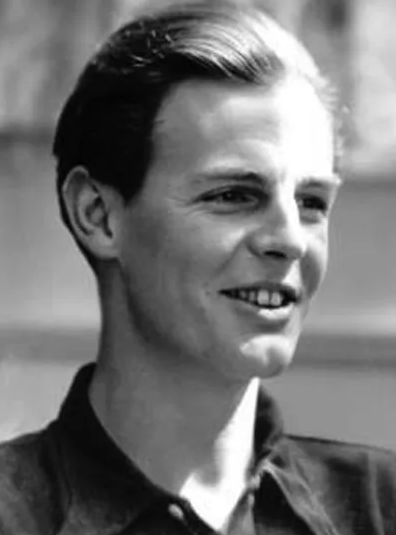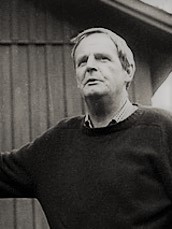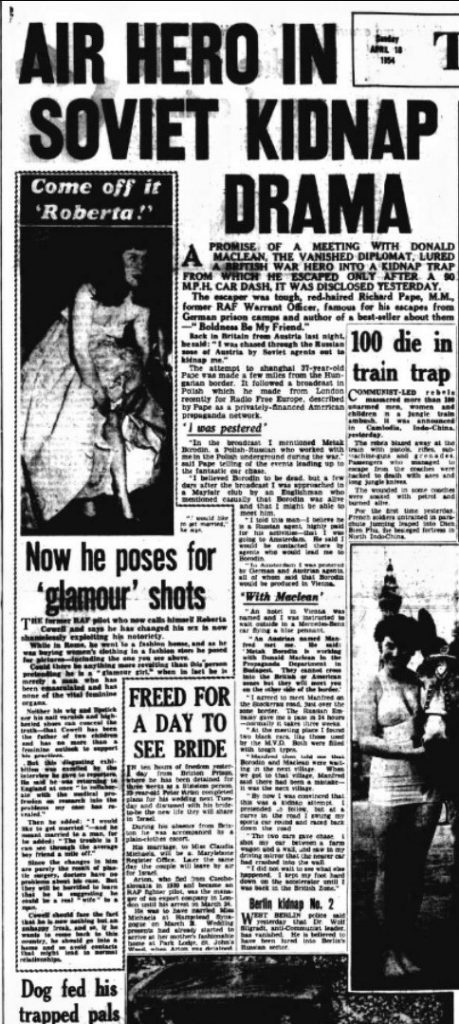Part two of this review is here

Published in 1954, Arm Me Audacity is a fascinating thriller, particularly when read from the standpoint of the 21st-century. Its author, Richard Pape, was a former RAF man who had turned his wartime exploits —captured and tortured by the Nazis only to then escape by ingenious and dashing means— into an autobiographical bestseller Boldness Be My Friend (1953).
Arm Me Audacity tells the story of Anthony Petheran, an Englishman with a wartime biography similar to that of the author, who hatches a plan to travel behind the Iron Curtain and assassinate a British defector to the Soviet Union.
This book, we are told in its preface
bears the absolute stamp of truth… [And] makes the reader wonder whether it is only in the interests of security that this book is described as a novel.
The impression is created by the preface to Arm Me Audacity that the work of fiction in the reader’s hands may in fact not be fiction. Before —in part two of this review— getting into the plot and portrayal of Russia, we consider the ‘fiction or not’ question.
There is little doubting the push on the part of author and/or publisher for this rather slight story to be considered as lightly disguised autobiography. The British defector whom our hero Petheran is seeking to meet and kill is called McLeod. The back cover blurb of my copy (from the 1960s) makes it clear that for McLeod we should read Donald Maclean, well known member of the Cambridge spy ring who fled to Moscow in 1951.


Donald Maclean secretly left England in 1951, and settled in the USSR. His presence there was not admitted by the Soviet authorities until 1956. Maclean later worked under an assumed name in IMEMO (the Institute of World Economy and Global Affairs). In 1972 a directive went out from Yevgeny Primakov, Deputy Director of IMEMO (and, more than a quarter of a century later, Prime Minister of Russia) that said: ‘the researcher Mark Petrovich Frazer will from now on be listed as Donald Donaldovich Maclean’.
The short preface to Arm Me Audacity quotes directly from a 1954 article in The People newspaper. The headline of that front-page article in The People was ‘Air Hero in Soviet Kidnap Drama’, and it went on to describe how
a promise of a meeting with Donald Maclean, the vanished diplomat, lured a British war hero into a kidnap trap from which he escaped only after a 90 mph car–dash. The escaper was tough, red-haired Richard Pape, M.M., former RAF warrant officer, famous for his escapes from German prison camps, and author of a best-seller about them.
the people, 18 April 1954
This article includes a number of details which match the plot of Arm Me Audacity and are not quoted in the novel’s preface:


that Pape had made a broadcast on behalf of Radio Free Europe aimed at Polish dissidents with whom he had worked when they were part of the Polish resistance in World War II;
and that he had fled from Soviet control in an audacious car chase.
that he had been told to go to Amsterdam where he would be contacted by a Russian agent;
that he had been invited to go to Vienna, where the Soviet authorities would grant him a meeting with Maclean across the Hungarian border;
and that he had fled from Soviet control in an audacious car chase.
Certainly, if the article in The People is true, then Pape’s novel draws on extraordinary personal experience. But was the novel based on the experiences as set out in that article? Or was the article based on the plot of the novel?
Some of those acquainted with Richard Pape thought him capable of embellishing the truth. One national newspaper obituary called him
brutally drunk, murderous, treacherous and sly
The Independent, 12 July 1995
Yes. That is from an actual obituary. Whatever happened to sugar-coating and not speaking ill of the dead?
A detailed post on an online aviation forum bore the heading “Boldness Be My friend” by Richard Pape – a pack of lies?, and drew attention to a memoir by New Zealander Gordon Woodroofe, a World War II pilot who had come across Pape and is quoted as saying of him,
Richard was good at transposing himself into the hero’s role of someone else’s experience and telling an exciting tale by doing so.
The article in The People appeared in April 1954. If, as newspapers do, The People was reporting a recent event, then Pape and his publisher must have worked with remarkable alacrity to turn these events into a work of fiction on the bookshelves later that year. In any case, The People was —not to put too fine a point on it— as much, if not more, akin to a scandal sheet than to what one might call a newspaper of record. Its article quotes no other source than Pape himself. There seems to be little in the way of fact checking here.
There is one more intriguing side element relating the article in The People to Arm Me Audacity.
Pape himself was clearly something of a character. His obituary makes reference to him wielding a sword stick. The hero of Arm Me Audacity, Anthony Petheran, carries such a sword stick around with him all the time and —for reasons too detailed to set out here— gives it the nickname Roberta. A glance at the front page of The People on 18 April 1954 shows that the article to the left of the one headlined ‘Air Hero in Soviet Kidnap Drama’ covers —in what we might today term a transphobic manner— the story of another former RAF pilot who
calls himself Roberta … says he has changed his sex and is now shamelessly exploiting his notoriety
the people, 18 April 1954
The 1950s, eh? Different times indeed. Enough about the background and the author – what about the book itself? And in particular, for the purposes of this review, how does Arm Me Audacity deal with Russia?
All of that is coming up in part two of this review.